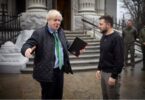Yossi Mekelberg
Benjamin Netanyahu has always felt more comfortable spending time outside of Israel than in it. This might sound odd for someone who has built his entire career on a rather extreme nationalist version of Zionism.
He spent a considerable part of his formative years in the US, at a time when Israel’s politics, society and economy were dominated by the left in all its shades. Being born into a family with deep roots in the intellectual right, a position that during his youth was rather ostracized and marginalized in Israel, his place of refuge was mainly America.
At one point he even changed his surname to Nitai, suggesting that he was making it easier for Americans to pronounce. Some suggested he was not comfortable with his Israeli identity and contemplating settling elsewhere.
Throughout his political career, it has been hard to tell exactly what he stands for. The gap between his rhetoric and his policies is impossible to explain. Has it all been power for the sake of power, led by opportunism, or have there been some ideological foundations underpinned by a value system to support a leader who is mainly a pragmatist?
In his heyday, his intelligence and charisma, combined with media skills and a manipulative nature, propelled him to become the most powerful politician Israel had seen for a very long time. However, what we have witnessed since he returned to the prime minister’s office in December last year is a pale version of that man.
Deep down he must know that his sixth government is a cynical aberration, even for someone whose cynicism and political buccaneering have played a major part in his becoming the longest serving prime minister in the country’s history.
His actions and body language tell of someone who understands that he has run out of ideas and people to fool. He must also have realized by now that, beyond a relatively small number of supporters among the “Bibist” cult of loyalists, he has lost all credibility. The hundreds of thousands of people across the country, and abroad, who are protesting against his current administration’s actions are a constant reminder of this.
In search of some refuge from the insanity of this situation, Netanyahu has become a frequent flier, heading off on weekends abroad. However, these escapist trips could hardly be described as offering any respite from his troubles.
What might be hurting him most about these many visits abroad since forming his latest administration, is the cold shoulder — frozen, even — with which he is being met.
Inspired by former US President Ronald Reagan and former British Prime Minister Margaret Thatcher, Netanyahu, who has always fashioned himself as a statesman of the first order and as having Churchillian qualities, has been greeted by lukewarm receptions from his hosts and heated protests in the streets. He might once have been propped up by his self-aggrandizing pose, but nowadays hardly anyone in the world he visits even remotely falls for this.
And if his government continues its program of so-called judicial reforms, which are bound to destroy the very fabric of his country’s democracy, he might find himself not only under siege by protesters at home, but also a pariah in all the capitals in which he and, not least, his wife have long been used to enjoying luxurious weekends.
In fact, one of the big mysteries during the short time that Netanyahu’s current coalition has been in power is why he insists on traveling abroad at all. It only fuels more anger at home, while overseas he receives lectures in democracy from world leaders wherever he goes.
Like any Israeli leader, the kudos that come from a visit to the White House are his dream, but Washington is currently in no hurry to invite an Israeli prime minister who is undermining one of the major pillars of the bond between the two countries: Their shared liberal-democratic values.
In a year during which Israel is celebrating the 75th anniversary of its independence, there might, under normal circumstances, have been little doubt that a celebratory meeting between President Biden and Prime Minister Netanyahu would take place. However, neither officials in Washington nor America’s Jewish community care to be associated with someone who is taking the Jewish state to a very dark place at this stage in its short history.
Instead, the White House, in a public rebuttal to the Israeli government, has expressed its support for President Isaac Herzog’s continuing efforts to seek a solution to the constitutional crisis that is consistent with democratic principles.
Common sense would seem to dictate that while his government is following a path that involves legislating for the most radical constitutional changes, which will eliminate both elements of the expression “liberal democracy,” and while masses of people are protesting in the streets, the Israeli prime minister should limit his time abroad and concentrate on resolving this domestic crisis before it escalates any further.
Instead, almost every weekend, accompanied on most occasions by his wife, Sarah, and a sizable entourage, Netanyahu packs his suitcase and heads for yet another world capital. In the very short time this government has been in office, he has already been to Paris, Rome, Berlin and, most recently, London.
These excursions make use of specially chartered aircraft, and many pilots are said to have refused to fly them in protest against the judicial coup. Netanyahu is spending entire weekends in luxurious hotels, although his official meetings are usually very short.
It is difficult to figure out what is he trying to achieve. Is he trying to keep on playing the big statesman and, by doing so, project power? Is it about avoiding the harsh realities at home? Or has he become blind to the fact that he is not welcome abroad, nor among at least half of the population at home? The answer is probably a bit of all of the above.
If in the past Netanyahu — and equally, if not more so, his wife — found solace in other countries away from the thorny front lines of Israeli politics, where they were embraced by Jewish communities abroad and enjoyed the perks of official visits bestowed upon them by their hosts in accordance with diplomatic protocols, which allowed him to convey to Israelis that their prime minister was a respected player on the world stage, then all of that is now a distant memory, confined to the past alongside Netanyahu’s hopes for a political future.
These weekend excursions will not save him from the constitutional crisis and upheavals that are of his own making. Nor will they save him from his corruption trial. Sadly, the only thing they will do is help to tear Israeli society apart.
Under these circumstances, what is desperately needed is for a child to cry out, as Netanyahu’s motorcade zooms through the streets of yet another European capital: “The Emperor has no clothes!”
That child might add that this particular emperor also has no shame.







